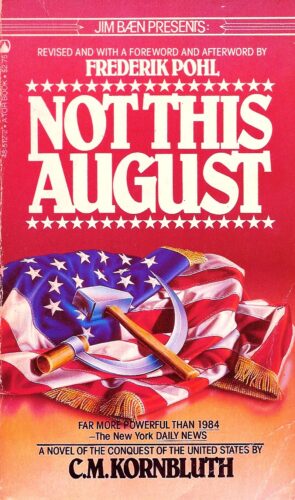While I don’t think it lives up to the blurb on the cover from the New York Daily News that it’s “far more powerful than 1984,” it is more grounded in the contemporary geopolitical reality of its 1955 publication date. In in the then-near future, a ground war being waged by the USA against the USSR and China simultaneously leads to an American surrender and an occupation by both foes. In upstate New York, Korean war vet turned farmer Billy deals with the new diktats of his communist overlords until they push him too far and he seeks out a role with the inevitable resistance.
Of special note are the formerly idealistic underground Communists who had been laying the groundwork for their glorious revolution here in America: Once the Soviets march in, their hopeful revolutionaries are rounded up and summarily shot. There is no need of revolutionaries after the revolution, and their idealistic energy would foul up the real-world application of the Soviet boot to the American face.
Kornbluth’s prose isn’t dated at all; if it weren’t for his untimely death at the age of 34, he would have become a giant of both genre fiction and American letters, relegating Asimov and Heinlein to mere footnotes.

I did a book report on “Not This August” in 5th grade (1959) and was sent to the principal’s office. I had to surrender my inappropriate !paperback! book that had adult language. I had already seen “1984” (1956 film) at the drive-in with Mom and Dad, and soon bought Orwell’s book. Couple of years later I discovered Ray Bradbury’s “Fahenheit 451”. Decades later, I bought a replacement copy of “Not This August”.
I was very impressed with this book.
“Not this August, nor this September …” — Ernest Hemingway, “Notes on the Next War”, Esquire, Sep 1935.
The principal’s office, huh? How cruel.
Jeeze, the good ol’ days, eh? I was summoned to the counselor’s office for reading GWTW (Gone with the Wind) at 11, and my mother was expected to show up and explain!
She showed up (livid) and explained, all right, and in *no* uncertain terms. I seem to recall that they never “asked” her back again. LOL. That was the mid-60’s. Ha!
Nice. We had a bookmobile in the late ’70s, and it was firmly established: Nathan can get anything. As many as he wants.
Good on your family. Reading really is the path to freedom, in every possible way.
What was the pretext for wrongdoing in reading GWTW?
I hope your mother called them a bunch of fascist-Nazis or something.